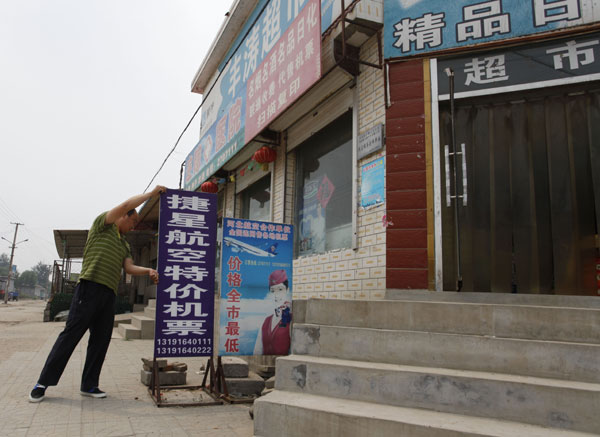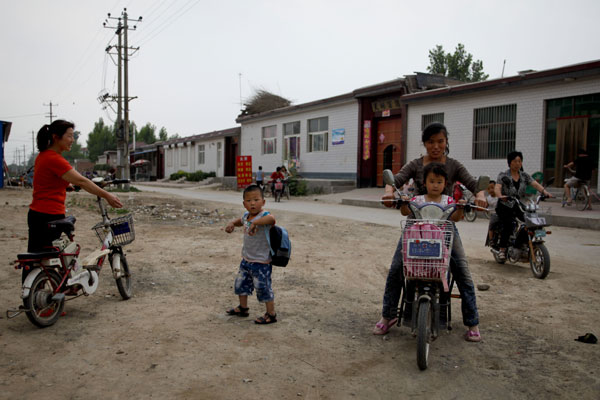Workers overseas: in and out of Africa
Updated: 2012-06-11 08:11
By Hu Yongqi in Dingzhou, Hebei (China Daily)
|
|||||||||||
Workers discover that Africa can be both rewarding and risky, reports Hu Yongqi in Dingzhou, Hebei province.
For large parts of the day, Lujiazhuang, in Dingzhou city, looks like a ghost town. Few of the 3,000 registered residents walk along the streets, bordered by two-story houses. The only faces visible belong to the young or the elderly. People of working age seem few and far between.
The only time the village shows signs of life are during the noon break or at dusk, when the kids come out of kindergarten and elementary school, playing the old game of throwing schoolbags at each other to see who can be knocked off their bike, amid much giggling and shouting. However, at nightfall a hush descends on the streets and everything is quiet once again.
In common with many villages in China, much of the workforce has moved away in search of well-paid jobs. Visitors may be surprised to see a shop selling air tickets, right in the center of the village, but Lujiazhuang has more than 500 men who regularly work overseas.
Every year, about 300 locals buy tickets at the shop. The owner, Sun Fengtao, 40, said that about 70 percent of the village's labor force works abroad. About 10 years ago, 90 percent of those workers headed for Africa.
However, things don't always go smoothly. Last month, Nigerian immigration officials arrested 100 Chinese for living and trading in the country illegally. Although 70 were soon released, the incident highlighted the precarious nature of the lives of these Chinese nationals looking to find their fortune in Africa, where opportunities and risks coexist. However, as wages rise in China, many of the emigres are considering returning home for good.
Good earnings
|
||||
In 1995, he joined a construction company working in Mauritius. Although the job was tough in the hot climate, he managed to stick it out and earned approximately 70,000 yuan ($11,000) in the first year. Every year his salary increased and by 2009, making 10,000 yuan a month was a piece of cake.
The exodus from the village began in 1989, when poverty drove the locals to find new ways of making money. At that time, the only way to make a living was by farming. Each family had 0.84 hectare of land on average, so small that it could only produce enough food for each family's needs. Villagers were desperate to earn more money to cover daily expenses and the fees for their children's schooling - because the village was not included in China's free compulsory education system until 1999.
In 1989, Li Zhenying, now 56, began recruiting workers for a company that was building hospitals in Accra, Ghana. The employer promised to pay 15,000 to 20,000 yuan a year, 10 times more than the villagers could make at home.
However, the villagers were hesitant as they vacillated between their thirst for money and fear of the unknown. "Ignorance of the outside world became a fear of going abroad. People even questioned if we would come back alive," said Gao Zengxin, one of the trailblazers.
"But we had no choice. Poverty was like a mountain weighing down on us, and I had to take the first step," he said. Eventually, four other men joined Li and Gao on the project. The six signed two-year contracts and departed for Africa. Their families didn't hear from them for the next two years and rumors spread that they had been killed.
However, in 1991, Gao returned with 30,000 yuan in cash and a color TV set, a luxury appliance in those days. On his first night at home, he became a lecturer when neighbors swarmed into his thatched house, which he soon upgraded to a two-story building. "I could see the eagerness in their eyes," he said.
For the 10 years that followed, the villagers benefited from Chinese-aided construction projects in African countries. Although the men had little knowledge of high technology, they were experienced in construction work, especially in the fields of carpentry and bricklaying.
Some of the more ambitious increased their incomes by setting up their own businesses. Most of them were contracted to hire people from neighboring villages to work on projects. Guo Pingliang, 48, worked as a carpenter in the Angolan capital, Luanda, from 1997 until 2007. When he had amassed savings of 600,000 yuan, he hired 10 people, using his savings to pay their wages. They worked as a part of team constructing an athletics stadium in Kinshasa in the Democratic Republic of Congo, and the project brought Guo income of more than 200,000 yuan.
Roughly 2,000 Dingzhou residents are currently working overseas and international migrant workers from Lujiazhuang earned a combined 50 million yuan last year.
Sun Fengtao, the air ticket vendor, said that more than 90 percent of workers from Lujiazhuang went to Africa before 2002, but now most prefer Singapore, which is regarded as being much safer.
|
 |
| Bian Zili, 47, recently returned to China from Kuito in Angola. Photos by Kuang Linhua / for China Daily |
According to An Pengfei, manager of the Jianghai International Labor Agency in Dingzhou, only 200 out of 1,000 workers provided by his agency went to Africa last year. The shift began as people began to learn more about working conditions in Africa increased and decided that the continent was no longer a desirable place to work.
Today's Top News
President Xi confident in recovery from quake
H7N9 update: 104 cases, 21 deaths
Telecom workers restore links
Coal mine blast kills 18 in Jilin
Intl scholarship puts China on the map
More bird flu patients discharged
Gold loses sheen, but still a safe bet
US 'turns blind eye to human rights'
Hot Topics
Lunar probe , China growth forecasts, Emission rules get tougher, China seen through 'colored lens', International board,
Editor's Picks

|

|

|

|

|

|







